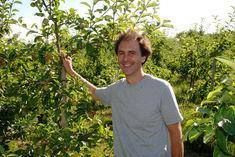
A new English dessert organic apple trial is underway in Kent on Nichol Farm, Sittingbourne for Waitrose, as a result of joint co-operation between the retailer and Fruition, its category manager for all top fruit.
They have also been chosen because they are believed to be more adaptable to UK growing conditions due to their resistance to scab and mildew, which tends to affect many of the better known commercial varieties.
By the end of April a selection of potential winners will be planted by Nicolas Moor in a concept orchard which can take up to 1,300 trees. He is one of the 22 members of the Waitrose English grower group that source the multiple which has an already established reputation for developing organics and has a 14 percent share of the total market.
The initial 800 spaces, which are now being filled, will include a range of varieties which already look promising such as Pinova, Red Pinova (Evelina), Dalinbel, Jonogold and Regal Prince, as well as several which are only just coming of stream, or are virtually unknown.
“These include the trademarked Juliet, which has already made its appearance at international fruit shows, and for the first time Zari - a Belgian Elsta/Delbarestival cross which Fruition has already obtained exclusivity for Waitrose,” revealed Claire Donovan, technical controller. “Additionally, we are planning to trial Topaz next year.”
Donovan also provides more details on several of the varieties which have been jointly chosen.
There will be 100 Pinova trees - which is also known as Sonata, and Corail. It is a cross between Golden Delicious and Civia. The latter is a cross between Cox and Duchess of Oldenburg, so it combines taste with coloration and yield.
Originally bred at Plintz in Germany 18 year ago, and although not from a resistance breeding programme, it has medium resistance to both scab and mildew, and the shape, storage stability and shelf life of Golden.
Two hundred Dalinbel have been ordered from French nurserymen Davodeau Ligonniere. This is scab resistant, and yields medium to large sized fruit in the 75-85 mm band. Bright orange red with up to 70 percent striped and blush colour on a yellow background, it has a rustic finish as there can be some russet depending on the season.
Juliet is a new French apple bred in the south west of France by Benoit Escande, It is has a bright red streak on a yellow background and is sweet and juicy with a Brix reading above 15 degrees.
There will be 50 Zari, which are harvested at the end of August, a week after Delbarestival. Oblong and conical, it is relatively large (70-80 mm) with 75 percent over colour on a yellow green background with white lenticels.
Apart from being sweet, crisp and juicy it has a delicate aroma. It also fulfils important elements of overall criteria defined by Fruition in that it has good shelf life and storability.
“The overall criteria must be to develop viable organic varieties in UK conditions, but also deliver the flavour customers are accustomed to with conventional varieties,” Donovan says. “We are trying to find varieties that deliver flavour and excellent eating characteristics to the customer, but offer a viable return to the grower.”
Alongside the trial, development work is going on to enhance soil condition in consultation with ORM Professional Products, based near Canterbury. A probiotic for plants, Wormcast-Pro is produced by the feeding action of earthworms, which turn organic waste into a finely divided humus rich material, which enhances and adds microbial activity, facilitates uptake of nutrients and improves water retention. Wormcast-Pro will be incorporated into the planting soil. Donovan is enthusiastic over the potential for using a second product, the liquid extract Wormcast-Pro Tea, as a disease suppression tool when applied to the foliage.
Green compost is also being sourced to assess if organic trees benefit by being planted into an alternative medium.
“We are also talking to Plant Works at Sittingbourne, which has developed soil additives based on thirty years practical and applied research in the field of mycorrhizal fungi,” she says.
The fungi is applied in the root system prior to planting and the research suggests that the treatments enhance the plants ability to take up nutrients but especially phosphorous.
It also provides protection against ‘specific Apple replant disorder’, and potentially drought stress.
“Looking at areas such as mycorrhizal bacteria and worm cast, it is aimed at helping to increase yields and healthy trees, with natural inputs,” she concluded. l



